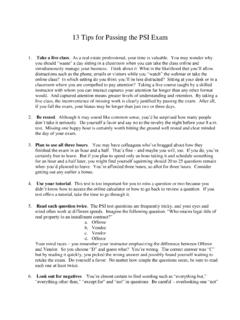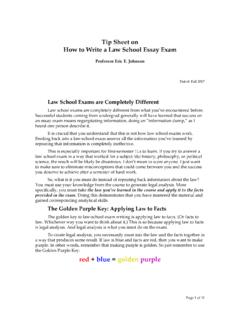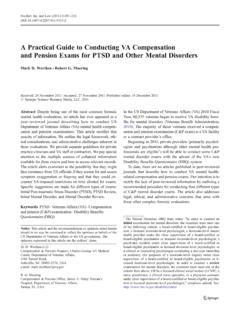Transcription of IRS ENROLLED AGENT EXAMINATION - Dynasty School
1 IRS ENROLLED AGENT EXAMINATION INTRODUCTION AND tips INTRODUCTION AND Q & A's The Internal Revenue Service Special Enrollment EXAMINATION is offered Once each year for individuals who wish to be ENROLLED to practice before the Internal Revenue Service ( ENROLLED Agents). It is comprised of four parts. Candidates must take all four parts of the EXAMINATION in the first year. Those who pass at least one part of the EXAMINATION in the first year may take the failed parts in the following three years with these provisions: Candidates must achieve the minimum retention score on EACH part failed in the first year.
2 The minimum retention score is 90 percent of the passing score set for the part(s) failed. Candidates MUST take ALL failed parts of the EXAMINATION in the second year, all remaining parts the third year, and all remaining parts the fourth year. Candidates must achieve a score no less than 90 percent of the passing score for any parts taken in the second and third years in order to remain eligible to try again. That is to say that if you score below the minimum retention score on any part taken in the second or third year, you would be required to retake the EXAMINATION in its entirety should you wish to continue.
3 Candidates who do not pass all four parts of the EXAMINATION by the end of the fourth year must start over again. Candidates who pass three of the four parts the first year do NOT have to achieve the minimum retention score on the part failed. Therefore, they would be required to take only the part failed the following year. IMPORTANT DATES Exam Applications available from IRS call 800-829-3676 June 1 Deadline to submit exam applications to IRS July 31 1 IRS ENROLLED AGENT EXAMINATION INTRODUCTION AND tips Questions & Answers Question: If an individual is unable to retake the EXAMINATION in a subsequent year, would he/ she lose credit for EXAMINATION parts passed?
4 Answer: Yes, in most cases, since the EXAMINATION assumes continuity. However, if the candidate is able to give compelling reasons for a waiver, serious illness or a death in the family, it could be granted. Question: In the above situation, does the candidate still have only four years to complete the EXAMINATION successfully or is the candidate allowed additional years? Answer: The years a candidate misses taking the EXAMINATION under a waiver will not count against the four years. Each waiver would extend the period one year.
5 However, there is a six year [imitation. That is, the candidate must complete the EXAMINATION successfully within six years if granted any waiver, including years for which waivers are granted. Question: May an individual change the district in which he/she takes the EXAMINATION from year to year? Answer: Yes. Question: Would an individual who passed one or more parts of the EXAMINATION in the first year and again failed the parts he/she had to take in the second year be able to carry over first year credit? Answer: Yes.]
6 The candidate would retain credit for any part passed iii the first year for the remaining three years, provided he/she met the minimum retention score and parts required to be taken conditions as set forth above. Question: What if an individual took all four parts of the EXAMINATION in 1996 and did not pass any of the four parts? Answer: The four year requirement does not take effect until the candidate passes at least one part of the EXAMINATION . Question: May an individual take one part of the EXAMINATION per year for four years?
7 Answer: No. Candidates must take all four parts the first year, all failed parts the second year, all remaining failed parts in the third year, and all remaining failed parts in the fourth year. Question: How many years may an individual take the EXAMINATION without passing at least one part? Answer: There is no limit. 2 IRS ENROLLED AGENT EXAMINATION INTRODUCTION AND tips tips TO PASS THE EXAM Because the tax information is enormous, so we have extracted the key points relating to the EXAMINATION together with "exercises" to form a four-part WORKBOOK.
8 We recommend you study the WORKBOOK and the PAST IRS EXAMINATIONS AND QUESTIONS we supplied to you. You do not need to study all the IRS publications (SEE Package), you should use them as the indispensable references. Use the enclosed Special Enrollment EXAMINATION (SEE) Study Material Request and Mailing Label attached to order your IRS publications. (next page) Study the important Q-Cards (index cards) we prepared for you. These index cards contain the key information on topics relating to the IRS EA exam. You are not allowed to bring a calculator into the exam, so practice those computation questions by hand.
9 Pay more attentions to the computational questions in Section C first. These questions are worth 3 points each and it is important you finish them first. Answer the TRUE/FALSE questions (Section A)) last, because they are worth one point each and you have a 50% chance of picking the right answer. Many of the questions on Part 4 can be answered using common sense. The IRS likes to ask a few esoteric questions that will not be familiar to you. Read the questions carefully, if the question sounds like it makes sense, mark true.
10 Most of the true questions in Section A are statements right out of the IRS publications, IRC code, or regulations. Make sure you memorize all those true questions. On the last five year's exams if you had answered true to every questions on Section A, you would have passed that section of the exam. Do NOT attempt to learn every specific details of the tax law. You cannot. We have designed this course to give you "enough" tax information to pass all four parts of the exam the first time. The passing grade for last five years exams were between 50% to 58%.











